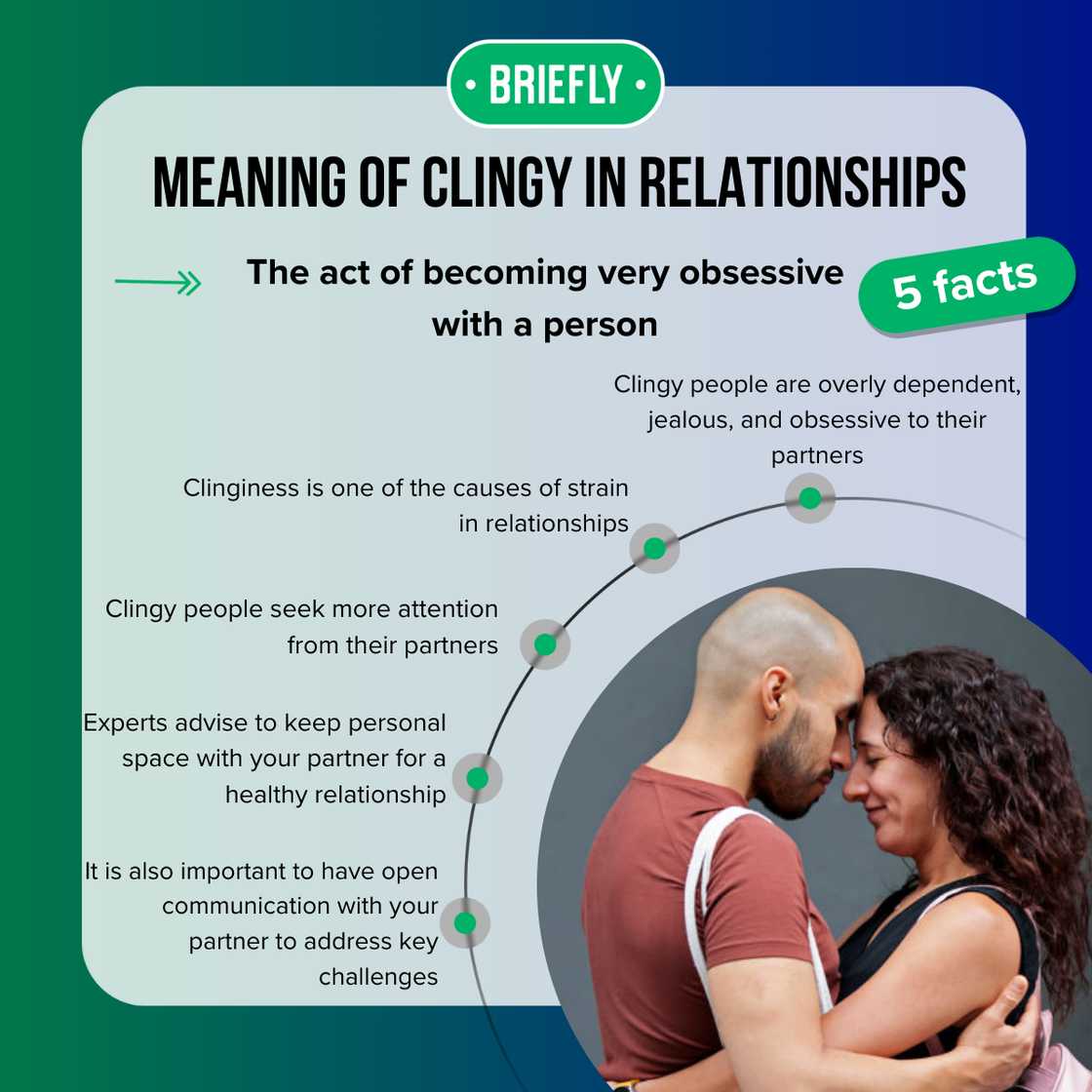'Clingy' meaning in relationship: Signs and how to overcome it
Having a clingy partner in a relationship can sometimes be annoying and boring. Have you ever been in that situation? It is a habit not everyone loves to see from their significant other. So, what is 'Clingy' meaning in relationships, and how do you overcome it?

Source: Getty Images
TABLE OF CONTENTS
Developing deeper connections with your partner as the relationship progresses is normal, but you may feel uncomfortable when these connections become clingy. We highlight the meaning of a clingy girlfriend and boyfriend and how to get them under control.
'Clingy' meaning in relationship
Clinginess is a tendency to become very obsessive with a person and not give them their own space. In a relationship, it refers to an overly dependent, jealous, and obsessive partner. Clingy people often develop deep-seated fear or insecurity about separation from their loved ones.
Why does a person become clingy?
Famous couples' therapist Beverley Andre LMFT explained what causes people to be clingy to others. She said,
Clingy behavior comes from a person's desire to fulfill their unmet needs, whether it be emotional, physical, spiritual, or mental.
The person is experiencing fear and anxiety that is attached to a belief they won't get their needs met, so they cling even harder to a person or situation to prevent the risk of this happening.
People of any gender can have clingy traits. It is also common among young children towards their parents. Some kids will probably cry when they cannot see their parents around.

Source: Original
Is being clingy toxic?
Acting clingy towards your significant other may not always be an attractive trait. It is one of the causes of strain in relationships. It is essential to work on this behaviour to have a more satisfying and healthy affair with your partner.
Signs of a clingy person
People manifest this behaviour in numerous forms, from seeking constant communication to frequently checking or surveilling their partner. Here are the signs that you are too attached to your lovebird.
- Bombarding your significant other with texts, emails, and video calls throughout the day when you are not together.
- Panicking and showing restlessness when someone is not responding to your communication.
- Constantly stalking your partner's activities on social media and movements.
- Feeling threatened by their friends or colleagues of the opposite sex.
- Getting nervous when you do not know what they are doing.
- Dedicating less and less time for your friends to spend more time with your partner.
- Reluctance to give your partner space by demanding constant cuddles and kisses.
- Frequently demanding to accompany your partner to every event they plan to attend.
- Constantly seeking reassurance of your partner's feelings for you.
- Sensitivity to changes in how your partner feels, speaks, or behaves.
- Speeding up the relationship quickly by professing love too early or dropping premature hints of marriage and having kids.
- When trying to avoid breaking up or moving on, even when the relationship is unhealthy or unstable.

Source: Getty Images
In 2013, celebrated singer Taylor Swift responded to claims that she was 'clingy, insane, and desperate girlfriend' in an interview with the US Magazine. Some believed the singer bought houses next to her boyfriends to be closer to them. Swift said,
People say that about me, that I apparently buy houses near every boy I like — that's a thing that I apparently do. If I like you I will apparently buy up the real estate market just to freak you out so you leave me.
Swift had several high-profile relationships before meeting her now-boyfriend Travis Kelce of the Kansas City Chiefs.
Effect of clinginess on a relationship
Dr. Lori Lawrenz, a licensed clinical psychologist, explains how clinginess and anxious attachment affect friendships. she said,
Those with an anxious attachment style can sabotage their relationships with questions and concerns about small details instead of being present and in the moment and enjoying their relationship.
When a lot of energy is spent thinking about if your partner is responding to you enough, or paying enough attention to you, it can be off-putting and turn your partner away.
Being too attached to your partner leads to overdependence on them, which limits your capabilities and productivity. It also causes frequent communication breakdowns and increases arguments between you two.

Source: Getty Images
How to stop being clingy in a relationship
Next, you would want to stop that habit, whether you or your partner. Some of the most renowned and best-paid psychologists have shared crucial steps you can adopt to reduce or eliminate the behaviour. Explore them below.
- Find out why you are excessively attached to your partner and work on addressing your needs.
- Seek treatment or counselling for any mental health symptoms you might experience, including anxiety and depression.
- Discuss your needs with your partner and be direct about them.
- Discover ways to improve your self-esteem and self-confidence.
- Find better ways to distract yourself from thinking about your partner. Some options are yoga, gym, jogging, and volunteering.
- Minimise your time on social media to avoid being tempted to stalk your partner.
- Establish boundaries with your friends and then respect them.
- Take time to focus on yourself and what you can do to improve yourself.
- Spend time with your friends and family, but ensure you are not neglecting your relationship.

Read also
Last Will and testament South Africa: Everything you should know about wills and testaments
What to do if your partner is a clingy person
Is your partner's clinginess affecting your health? Do you have second thoughts about the relationship? Try these strategies to help your partner and solve the issue.
- Discuss the issue together, explore the source of their clingy behaviour, and address it healthily.
- Engage a relationship counsellor or psychologist with your partner to help you find a working solution.
- Set healthy boundaries in your relationship to avoid misunderstandings or hurting your partner.
- Show compassion to your significant other and avoid harsh criticism and personal judgments.
- Reassure your partner that you will always be with them even as you implement these strategies.

Source: Getty Images
Frequently asked questions
A healthy relationship requires trust, communication, and mutual respect. An anxious attachment is dangerous and may lead to a breakup. Here are some frequently asked questions about clinginess behaviour.
- What is being clingy in a relationship? Being very attached to your partner and always wanting them around you.
- What makes a woman clingy? Insecurity, fear, anxiety, and excessive desire or need for their man.
- What is a clingy boyfriend like? Someone without boundaries and does not give their partners their personal space. They always want to follow their girlfriends everywhere and seek constant communication.
- Is clingy good or bad in a relationship? It is a toxic behaviour that can ruin a relationship. Although the intentions are good, the other partner feels suffocated and overwhelmed.
Being 'clingy' in relationships means the person shows a tendency to be anxiously attached to their partner. It is usually caused by fear and anxiety. Clinginess has ruined numerous relationships, but some have successfully implemented multiple strategies to curb it.
READ ALSO: Cardiologist salary and duties in South Africa
Briefly.co.za revealed how much a cardiologist earns in South Africa and their duties. It is one of the most sought-after professions with a lucrative income.
While the academic requirements for becoming a cardiologist are strict, income and personal fulfilment make the job worthwhile. Explore more about the profession to understand it better.
Source: Briefly News





